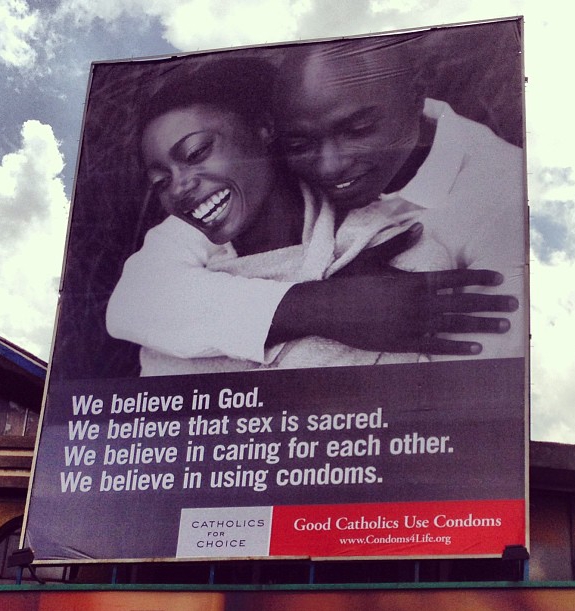Billboard and Newspapers in Nairobi Proclaim that “Good Catholics Use Condoms”
Nairobi, Kenya—The Condoms4Life Campaign today assured Kenyans that Catholics support the use of condoms to prevent the spread of HIV. A billboard in Nairobi and newspaper ads in the Standard (today) and the Daily Nation (on Sunday) show an authentically Catholic message supporting the use of condoms as an HIV prevention method.
 |
“The campaign is vital,” said CFC president and campaign coordinator Jon O’Brien, “because the bishops’ recent activities are not representative of Catholic teachings or beliefs. Catholics do support the use of condoms, and they do use them to protect themselves and their partners.”
In recent weeks, the Kenya Episcopal Conference spearheaded a campaign to pull a television ad promoting HIV prevention, including the use of condoms. “The ad was based on good science,” said O’Brien; “more than 1.6 million people are living with HIV in Kenya, and condoms are an evidence-based method for preventing the spread of HIV.
“There are a billion Catholic around the world, and here in Kenya we represent a third of the population. On the issue of condom use the Kenyan bishops don’t speak for Catholics here in Nairobi, or anywhere else,” O’Brien said, referring to a recent international poll that found that Catholics in Ghana, Ireland, Mexico, the US and the Philippines believe using condoms for HIV prevention is prolife because they help save lives. Further, six in ten Catholics from these countries believe Catholic hospitals that receive public funding should be required to provide condoms.”
The bishops’ anti-condom claims contradict Pope Benedict XVI who, in a series of statements in 2010, supported the use of condoms. Benedict stated that “where the intention is to reduce the risk of infection” condoms can be “a first step in a movement toward a different way, a more human way, of living sexuality.” The pope demonstrated that Catholics could be wholeheartedly in support of any and all means of combating a deadly virus affecting people around the world, affirming that people could use condoms to protect themselves and their partners, and that this was indeed a life-giving, moral choice.
Job Akuno from the National Organization of Peer Educators in Kenya applauded the new ads. He said, “The Condoms4Life campaign targets a critical mass and is a call to action to its leadership. It’s a strong, healthy, faith-based message by Catholics and for Catholics. We need more voices like theirs.”
“The aim of the campaign,” said O’Brien, “is to ensure that Catholics know that despite what the bishops say, Catholics can in good conscience use condoms. Catholics in Kenya are no different. They can take the steps to protect themselves and their partners against HIV.”
“Unfortunately, the Catholic hierarchy in Kenya and elsewhere seems determined to threaten public health in a doctrinal tug-of-war over a question that has been settled for years. Catholics are less shocked by discussions about caring choices between partners than they are by the bishops’ prohibition on a proven method of prevention.”
Note to Editors: Catholics for Choice launched the Condoms4Life campaign in 2001 to raise awareness about the harmful effects of the bishops’ aggressive lobbying against condoms around the world. The advertisements have been a faithful representation of the kinds of decisions made by a diverse selection of Catholic couples. Since then, the Condoms4Life campaign has been promoted around the world with partners in Belgium, Bolivia, Canada, Chile, Germany, Kenya, Mexico, the Philippines, South Africa and Zimbabwe, as well as in Washington, DC, and New York City in the US.
-###-